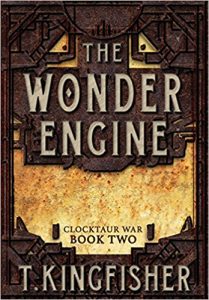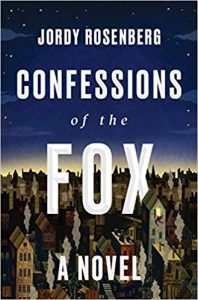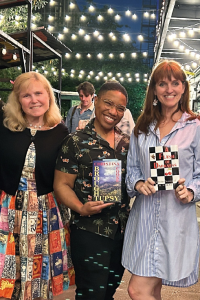2018 Year-in-Review by Adrienne Martini

These end-of-the-year lists always make me uncomfortable, if only because I know I haven’t read even a plurality of titles published in any given 365 days. Not only that, I haven’t yet read a bunch that have been highly praised, like Blackfish City, Revenant Gun, and Unholy Land. Having said that, what I do feel comfortable with is flagging a few titles that I’m mildly infatuated with, that happened to come out in 2018.
Like Kelly Robson’s Gods, Monsters, and the Lucky Peach. Not one word is wasted in this story, which has all of the future tech gee-whiz you could want but never forgets to make the characters human. Even when they are a god or a multi-legged cyborg. Chandler Klang Smith’s The Sky is Yours is that book’s polar opposite. It sprawls and meanders in delightful ways as it tells the story of a New York-like City that has been overtaken by two dragons who never leave the sky.
For sheer dazzle, Catherynne M. Valente’s Space Opera wins the year. While the story about an interstellar version of our planet’s Eurovision contest is equal parts Hitchhiker’s Guide and ABBA classic, what is even more impressive is how Valente bends the English language to her will. There are sentences (heck, paragraphs) that definitely should not work because they have too many words – and yet do.
 The next two (maybe three, depending on how you count) titles have less to do with the actual language and more to do with the sense of humor T. Kingfisher and John Scalzi bring to the worlds they’ve created. Kingfisher’s Clockwork Boys and The Wonder Engine – technically two titles but really one story – are set in a stereotypical medieval-esque fantasy world, one with gods and wizards. What makes these titles stand-out is the light wit Kingfisher (AKA Ursula Vernon) brings to the standard hero’s tale. The same can be said of Scalzi’s Consuming Fire, the second book in the Interdependency series. While the setting and props are pure space opera, his sardonic voice is what keeps you engaged.
The next two (maybe three, depending on how you count) titles have less to do with the actual language and more to do with the sense of humor T. Kingfisher and John Scalzi bring to the worlds they’ve created. Kingfisher’s Clockwork Boys and The Wonder Engine – technically two titles but really one story – are set in a stereotypical medieval-esque fantasy world, one with gods and wizards. What makes these titles stand-out is the light wit Kingfisher (AKA Ursula Vernon) brings to the standard hero’s tale. The same can be said of Scalzi’s Consuming Fire, the second book in the Interdependency series. While the setting and props are pure space opera, his sardonic voice is what keeps you engaged.
 The last two titles on my list play with the structure of how a story is told. Jody Rosenberg’s Confessions of the Fox goes meta as the writer researches a newly discovered manuscript about well-known London rogues. Katie Williams’s Tell the Machine Goodnight finds its magic in how what could be separate stories are juxtaposed, and characters evolve from one to the next.
The last two titles on my list play with the structure of how a story is told. Jody Rosenberg’s Confessions of the Fox goes meta as the writer researches a newly discovered manuscript about well-known London rogues. Katie Williams’s Tell the Machine Goodnight finds its magic in how what could be separate stories are juxtaposed, and characters evolve from one to the next.
I have zero doubt that I’ll fail to read the bulk of what 2019 has to offer, too. But if I end next year with equally delightful titles on that list, it will have been a good year.
Adrienne Martini has been reading or writing about science fiction for decades and has had two non-fiction, non-genre books published by Simon and Schuster. She lives in Upstate New York with one husband, two kids, and one corgi. She also runs a lot.
This and more like it in the February 2019 issue of Locus.
 While you are here, please take a moment to support Locus with a one-time or recurring donation. We rely on reader donations to keep the magazine and site going, and would like to keep the site paywall free, but WE NEED YOUR FINANCIAL SUPPORT to continue quality coverage of the science fiction and fantasy field.
While you are here, please take a moment to support Locus with a one-time or recurring donation. We rely on reader donations to keep the magazine and site going, and would like to keep the site paywall free, but WE NEED YOUR FINANCIAL SUPPORT to continue quality coverage of the science fiction and fantasy field.








